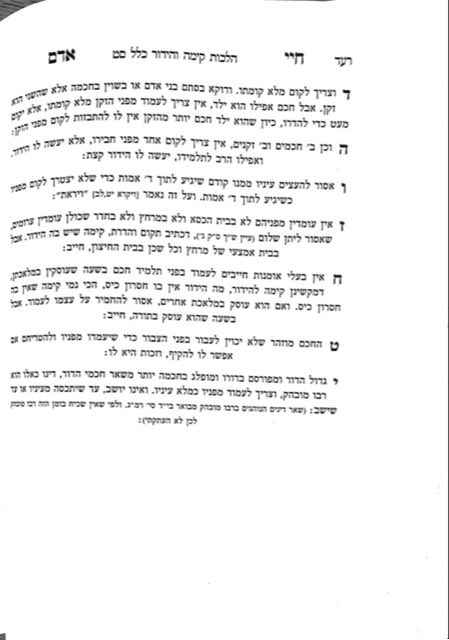We are beginning siman 7. The Chayei Adam writes that there is no chiyuv of kimah in any place in which one cannot say “Shalom” to someone else. Shalom is one of Hashem’s names, so it cannot be recited in places such as a beis hamerchatz. There is no chiyuv of kimah in such a place because such places have no hiddur, as we have learned previously (shiur 1485)..
The Chayei Adam clarifies that there are three parts to the beis hamerchatz. In the outermost room, where everyone is fully clothed, one would be chayav to stand up, just as one could say Shalom in such a place. In the middle section, where some people are fully clothed and some are not, the Chayei Adam holds there is still a chiyuv to stand up, and it would still be muttar to say Shalom. It is only in the innermost room, where everyone is undressed, that the Chayei Adam holds there is no chiyuv to stand up, and that it is assur to say Shalom.
In siman 8, the Chayei Adam writes that a worker, both if hired to someone else or self-employed, is not chayav to stand up while working. The Chayei Adam explains, based on the Gemara, that one is not chayav to take a financial loss to perform kimah. One is certainly allowed to be machmir and stand up when working for themselves, but cannot be machmir when working for someone else. The level of financial loss does not have to be significant; even a small financial loss is enough to exempt from kimah. Although we generally have a rule that one is not patur from a mitzvas asei until the mitzvah will cost them more than one fifth of their money (see shiur 1439), Chazal learn a specific drasha here which exempts from the one fifth requirement.
However, the Chayei Adam writes that one must stand up when they are learning, even if this will interrupt their learning, because the chiyuv of giving kavod to Torah overrides learning Torah. We find this concept expressed regarding the halacha that we stop learning in order to join the levaya of someone who learned Torah. The concept of kavod hatorah expressed by joining the levaya overrides the mitzvah of limud hatorah. Part of the process of receiving Torah is to absorb Torah, and it is absorbed by appreciating the value of Torah and the impact it has on the individuals who learn it, as expressed by the kavod given to the niftar.
Summary
- One does not stand up in a place where there is no hiddur, such as a beis hamerchatz or beis hakisei.
- One does not stand up if they are working, and standing up will cause even the slightest financial loss. If one is working for themselves, they are welcome to be machmir, but if working for someone else, they cannot be machmir on their employer’s account.
- Limmud hatorah is interrupted in order to stand up, just as it is interrupted for a levaya, as kavod hatorah overrides limmud hatorah.



